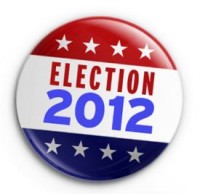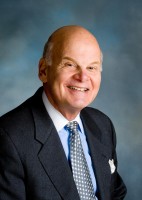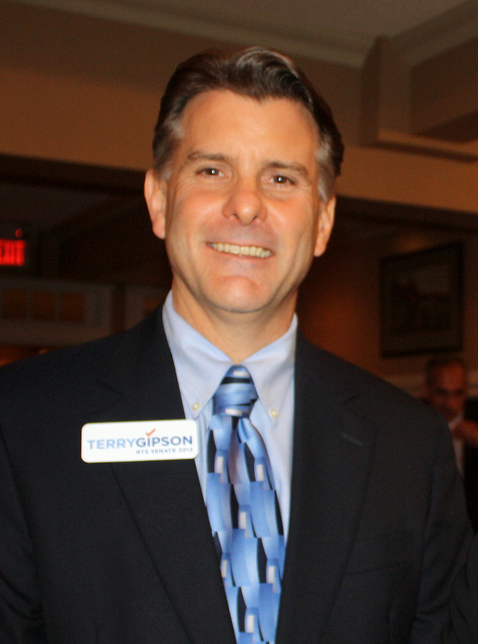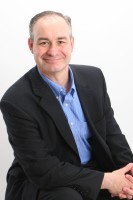41st State Senate District: Saland vs. Gipson vs. DiCarlo
 Republican incumbent State Senator Steve Saland is facing challengers Democrat Terry Gipson and Conservative Party candidate Neil DiCarlo to represent the 41st Senate District, which includes Philipstown, Putnam Valley and Kent, in the Nov. 6 general election.
Republican incumbent State Senator Steve Saland is facing challengers Democrat Terry Gipson and Conservative Party candidate Neil DiCarlo to represent the 41st Senate District, which includes Philipstown, Putnam Valley and Kent, in the Nov. 6 general election.
Saland, who lives in Poughkeepsie and is a lifelong Dutchess County resident, is an attorney and has held the seat for the past 22 years and was in the state assembly for a decade previous. Gispon has lived in Rhinebeck for five years, where he is serving his second term on the village board trustees and owns a small business that makes scenery for live shows and event. DiCarlo lives in Brewster – and will have to move into the 41st District within a year if elected — and is the chief compliance officer for a Wall Street firm. In 2010, DiCarlo unsuccessfully ran against Nan Hayworth in the Republican primary for U.S. Congress.

Earlier this month, Democratic Governor Andrew Cuomo endorsed Saland for reelection over his own party’s candidate. Gipson’s campaign attributed this to Saland’s deciding vote on legalizing same-sex marriage; a vote which prompted third-party candidate DiCarlo to mount an unsuccessful Republican primary challenge against Saland.
During sit-down interviews, Saland and Gipson drew sharp distinctions on where they stood on the issues. DiCarlo was contacted several times to do the same.
Gipson said he wanted to move toward an income-based model of funding the state’s schools, based on an individual’s ability to pay as opposed to the assessed value of their property. If instituted, this would mean school taxes would be paid via the state income tax and redistributed to all of the state’s school districts.
Saland said he favored the implementation of a “circuit breaker system,” to deal with ever increasing school taxes, that would provide tax credits based on a homeowners income, increasing in percentage for lower income people.
On jobs, Saland said the state didn’t have the power to create jobs, but, once again, could offer tax credits to employers who add new jobs to the payroll; increasing those incentives for those who hire off of the unemployment rolls or veterans.
Gipson said he was opposed to this as jobs creation tax credits only benefited big business.

Instead, he wanted to see billions of dollars in savings identified recently in state agencies and authorities, used to offer start-up businesses interest free loans to fund 20 percent of their payroll for the first three years, only if they hired locally.
On hydrofraulic drilling, Gipson said he was the only candidate in the race calling for a total ban.
Gipson said, in principal, he was not against drilling for natural gas, but that he objected to using the state’s water supply to do it, due to health and environmental concerns.
“Science should dictate, not viscera,” Saland said about the potential of fracking in western New York
“I’d like to see what happens when the Department of Environmental Conservation completes its investigation.”
Saland said that if the moratorium on fracking was lifted, he would want assurances put in place to compel drillers to fully disclose the chemicals they were putting in the ground.
According to his campaign website, DiCarlo is in favor of allowing fracking in New York State.
Saland said that he is against raising the minimum wage. He said that most people working minimum wage jobs are not heads of household, and that doing so would have a negative financial impact on employers. While negotiable on the amount so as to mitigate any negative impact, Gipson said he is in favor of raising the minimum wage to give young people a fighting chance to establish themselves.

All three of the candidates are in favor of the total abolition of the MTA payroll tax, if a court ruling deeming it unconstitutional is not upheld after appeal.
Gipson said he was in favor of a plan to slowly bring Medicaid totally back under state administration in order to reduce the financial burden it now places on counties.
Saland said he was “unalterably opposed” to doing so. He explained this was because, with rare exception, residents in counties throughout the state would see their state income tax increase in order fund Medicaid costs in New York City that he said spent 7 out of every 10 Medicaid dollars.

Adam has worked in the local news industry for the past two decades in Westchester County and the broader Hudson Valley. Read more from Adam’s author bio here.
